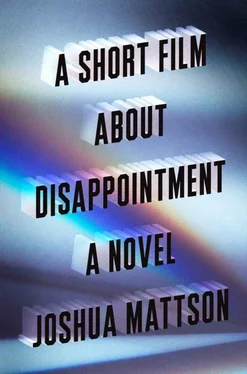Speaking of Tools , opening Sunday at Original Cin, I can, for example, restrict his blood from flowing to certain areas. It can be devastating when paired with the correct suggestive images. When Osvald prepares to make love, at my behest all he can think of is the scene in Interpermanence with the elderly ménage à trois.
Answering Pingers, haranguing caterers, paging assistants, summoning janitors. Accepting the tantrums of middle managers. Recounting their fits to Isabel in the evenings, his voice low with indignation and disappointment. Osvald leaves his designs on his desk, where they are visible to passing eminences. The principals and the designers, the serious and the trifling, the saved and the damned, have not commented. His B.A. in architecture impresses nobody at the firm, including the guest janitors. Finding ways to slip his design ambitions into conversation has proved to be a chore. He has never been a talker.
Gossamer working hours brushed away on the rail home. I see what he sees. He thinks of women. Osvald’s fantasies have no frisson without a plausible story. Without stories we have nothing to grip and twist. Karen, the HR assistant, has divorced her husband and is not sure how to date. The barista at Silver Bean likes his unorthodox satchel. She learns he sewed it himself. Isabel’s sister has a grudge against Isabel she needs to express. The woman on the rail likes the same Scandinavian dirge. His fantasies begin with his taste. His objects capture a woman’s attention.
Osvald’s longing ebbs and flows. The number of persons he has been inside makes him nervous. He fluffs it with a pair of make-outs, a wandering finger. He wonders how he can swagger up to the urinal with that count.
He attends company barbecues and lectures. Osvald hunts for people to impress the way he once scoured the network for Isabel’s personal information, hoping to find a tantalizing fact, a nice picture.
Osvald is confident his ideas will get attention. Passivity is a flavor of confidence. If he’d bring Isabel to company functions, let her make the friends, it would go faster, but Osvald, a thief, fears theft.
Osvald has the poor fortune to be overly competent. He will not be promoted to a job where he can upstage his superiors. The firm transferred him, after a season of groveling, to the head office in the Eastern Hub, away from Isabel’s family, away from people he knew, to whom he might have to explain himself. His desk is the first you encounter on a floor where draftspersons play darts, bend circuits, boast about hang gliding. There is nothing as exhausting as a person with disposable income.
He does not care for his coworkers. He squints to see what it is they have that he hasn’t. It seems to be nothing, maybe an absence, and he has something he ought to lose. He joins them for a beer when they condescend to ask. The place they go has no signage, no menus, no chairs. Osvald delights the architects by naming the music playing without fail. In fact, he can check on his Pinger, before they enter. The playlist is public. Everything can be touched, if one knows how to touch. He is satisfied to note his watches are more obscure than the architects’ sloppy throwbacks. At their gatherings, he does not speak unless he has a naughty, contrarian, or otherwise novel comment to contribute, to keep his reputation up. Office gossip excruciates him. A gap-toothed redhead who devises novel water systems and an interior designer in charge of paneling, molds, and etching have indicated with body language he is acceptable enough to be their mistake.
The days corrode his will. To relent to or contend with life. Either is okay so long as one is chosen. Another degree or another person or nothing, his Pinger, masturbation, pacifying foods, music, drawing, industrial accidents. To return to his process, which is a series of many minutes, a sequence, a set of minutes frightening when tabulated together. The bill is staggering when presented in whole. The bill of his minutes ought to be hidden from decent folks. One signs without looking.
By regulation, he cleans his desk on the sixth and the seventeenth day of each month. The bathrooms, designed by Leyak, the company exhibitionist, have tatami dividers, leaving one feeling exposed. Osvald cannot eliminate in these conditions. He is phobic of colorectal bacteria. In his bag are baby wipes, disposable gloves. Osvald has a propensity to clog toilets. He plunges in silence like a shinobi creeping across a lord’s bedroom. When we moved into our apartment, he waited until I was asleep to use the facilities.
Tools is about a doll maker who covets a doll he sees in a shop window. He inquires about the price of the doll, is informed the doll is not for sale, and resorts to murder to acquire the doll. I did not see it, but I did eavesdrop on a pair of women on a Mauve Line platform discussing the film. It does not sound very engaging. If you would have liked to judge for yourself, it was screening at the Handel yesterday but is no longer.
DIR. VICTOR NNAMANI
144 MINUTES
I agreed to curate the Conspicuous International Film Festival. The previous curator, a Bast emeritus, expired of a heart attack during a screening of Haupt’s Omega , specifically the scene when judgment is passed on the idolatrous village. The Bolivian government deported Haupt, so he burned the footage and reshot at Cueva de las Manos in Argentina. The curator was not mourned by the staff. He paid in change, pinched. When I die, I would like to be sat in a theater kept dry enough to desiccate my corpse. Five showings a day. Then I will never feel alone, or at least only until the next showing.
The owner of the Conspicuous held the festival for tax purposes. To hear him speak, the theater was in danger of bankruptcy, despite filling to capacity four nights a week. He owns the block. Theaters will never disappear. The reforms after the Confidence Crisis included the banning of home entertainment systems, along with the widespread curtailing of data usage, which has made it difficult to watch at home. It’s done, if you have the means, like Jonson, but it isn’t common. The owner of the Conspicuous is a cheap, miserable bastard, and I feel comfortable putting that in the Slaw , because I happen to know he’s illiterate.
Lest he offer the curatorship to Jonson, I felt obligated to take on the responsibility.
Who knows what dreck Jonson would choose, how many of his society buddies would pack the theater? He’d have the arrogance to make it a success.
Jonson’s pals are keen to align themselves with serious cinema. They ignore the avant-garde, the cranks, because they catch from them the stink of didacticism, the disdain of money at the kernel of serious process, and they want to get rich.
The festival lasted one Thursday and one Saturday, on the week the Firebats sequel was released. Shoals of costumed children left disappointed. Better they learn now.
On Thursday, we showed Rrepang’s What Was to a smattering of the neighborhood loonies. I invited the director to attend, but he declined.
He said, The Underunited States is a country dedicated to the innovation of inequalities.
For Saturday, I chose Okan . I sent flyers to the Nigerian Business Association. It was mentioned on Bast mailing lists and at the Well of Forever, an evangelical church with a ministry in New Zion. I pinged Jonson an invitation with specific instructions about whom to forward it to. The Voyageur ran a drink special called the Kilimanjaro, which was twenty ounces of draft beer in a tall thin glass, for five dollars, against my wishes.
In the pocket of my blazer on four cornflower index cards was my speech. The speech exhorted the necessity of cultural exchange. It sketched a brief history of West African cinema and what qualities distinguished it from cinema of the East and South. It posited Nnamani had seen the films of John Burr and Grace Green in a Benin City cinema, giving him the indelible picture of American machismo he undermines in Okan . It broke the ice with a little cineaste joke about the surrealist who walked into the lens shop. It didn’t go on too long.
Читать дальше












